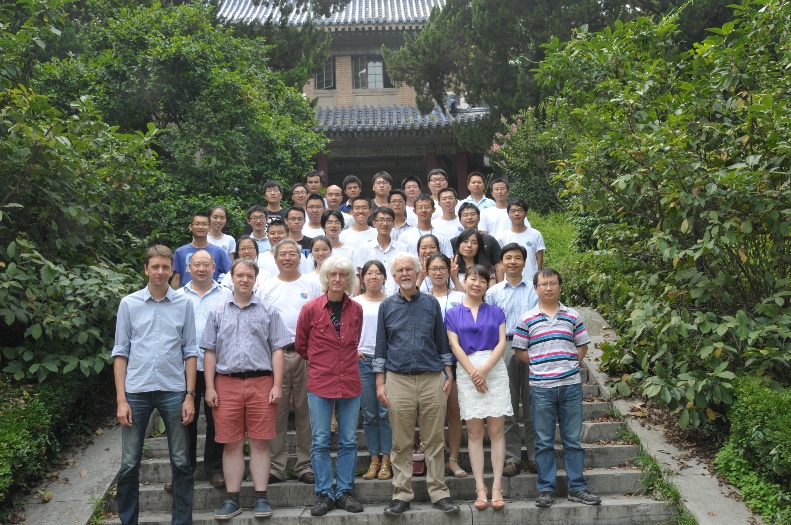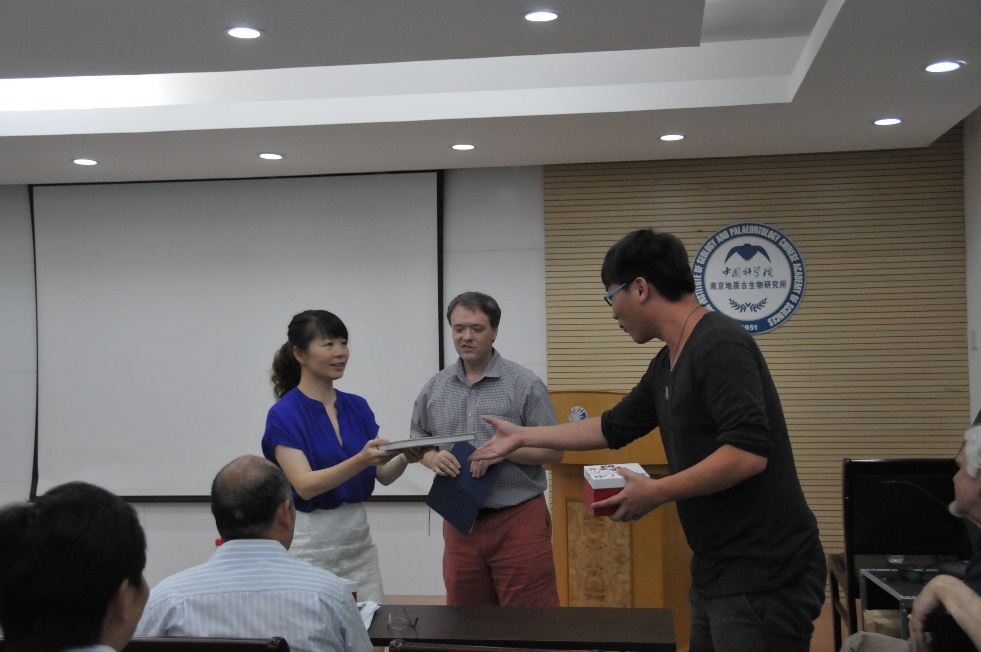The 2014 Sino-UK Coevolution of Life and the Planet Summer School, which was held in Nanjing Institute of Geology and Palaeontology, Chinese Academy of Sciences (NIGPAS) from 5th July to 11th July, has ended successfully. More than 40 participants took part from Maryland University (USA), University College London (UK) and 12 Chinese institutions.The summer school had the ‘Coevolution of life and the Planet: Palaeoenvironmental Research’ as its main theme. Coevolution, a recent topic of interest in the Geosciences, requires interdisciplinary research in the general domain of the Earth system sciences.
The three main convenors were Professor Maoyan Zhu from NIGPAS, Professor Graham Shields from University College London, UK and Ms Ying Zhou, the manager of NERC funded ‘Long-Term Coevolution of life and the Planet’ research programme, UK. Since late 90’s, Professor Zhu coordinated the long-term Sino-German and Sino-UK cooperative programs, and has been trying to discover how the coevolution of life and the environment led to the Cambrian bioradiation, and to train young researchers in interdisciplinary thinking through the cooperation. Professor Graham Shields is one of thesenior international scientists in NIGPAS, funded by the Chinese Academy of Sciences. His research on Chinese Strata from the Neoproterozoic Era can be traced back to as early as 1992. He is the science coordinator of the ‘Long-Term Coevolution of life and the Planet’ programme. In 2011, Professor Shields gave a 5-day Summer School with the theme ‘Geochemistry in Paleontological and Stratigraphic Research ’. The 2014 Sino-UK summer school is regarded as an extension of the 2011 summer school. As the manager of the NERC funded ‘Long-Term Coevolution of life and the Planet’ research programme, Ms Zhou has organised successfully two Spring Schools in the UK in 2012 and 2013. Both schoolswere aimed to bring together senior researchers and younger researchers from different disciplines within the broader framework of Earth System Science for scientific communication, knowledge transfer, horizon widening and network building. This time Ms Zhou aimed not only to bring this successful experience to NIGPAS, but also to strengthen international scientific exchange.
The purpose of 2014 Sino-UK Coevolution of Life and the Planet Summer School is to provide graduate students and early career postdoctoral researchers from relevant fieldswith an overview of state-of-the-art and hands-on paleoenvironmental research under the general focus of Coevolution; it also provides the participants a great opportunity to communicate with the invited scientists.7 leading scientists were invited to teach during the school: Prof. Martin Brasier from Oxford University; Prof. Simon Poulton from Leeds University; Prof. Hongfei Ling from Nanjing University; Prof. Xiangkun Zhu from Chinese Academy of Geosciences; Prof. Changqun Cao, Prof. Graham Shields and Prof. Maoyan Zhu from NIGPAS.They are all senior researchers working actively in various earth science disciplines from the UK and China.
The school was composed of 2 days of field course and 5 days of lectures and seminars. The first day of field course was led by Prof. Maoyan Zhu and Professor Shields with focus on Ordovician Strata plus sampling protocols; the second day of field course was led by Prof. Changqun Cao on the P-T GSSP site in Changxing County, Zhejiang province. For the seminar part, the main subjects this school covered included: 1. Stratigraphy and Sedimentology for Paleoenvironmental Research; 2. Chemostratigraphy; 3. Carbon Isotope interpretations and lab tour; 4. Sulphur isotopes and Carbonate associated Sulphate; 5. Non-traditional stable isotopes; 6. Redox Geochemistry and Redox controls on Nutrient Cycling; 7. Principles of Mo Isotope composition as A Proxy of Global Oceanic Oxygenation State; 8. Introduction to biomarkers (Lab tour); and 9. Early steps in biological evolution:earliest signs of life, earliest eukaryotes and life on land and earliest animals.
All the participants prepared one poster to present their own research. 20 of them also gave an oral presentation. In total 2 excellent posters and 2 best talks were chosen for prizes. Through the school, the participants gained experience in presenting their projects in English (both via poster and via talk), they also took the opportunity to communicate with the invited scientists, to ask questions and to discuss with each other.
The school was funded by Chinese Ministry of Science and Technology funded 973 Project ‘From Snowball Earth to the Cambrian Explosion: Coevolution of Life and Environment around 600 myr ago’, NERC funded Research Programme: ‘Long Term Coevolution of Life and the Plane’, Chinese Natural Science Foundation (NSFC), State Key Laboratory of Palaeobiology and Stratigraphy, and the Technical Services Centre of NIGPAS.

Participants of the 2014 Sino-UK Coevolution of Life and the Planet Summer School

(Information Source: Nanjing Institute of Geology and Paleontology, CAS)

